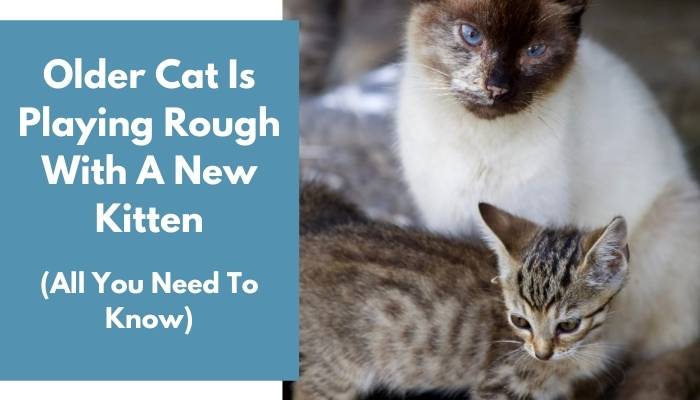Just like any other animals, cats do play. It is a normal cat’s behavior, which helps them provide opportunities to develop their physical coordination and problem-solving skills.
But why is the older cat playing rough with a new kitten? Older cats may play rough with new kittens due to their mock aggression. It is normal for cats to play rough because stalking, chasing, and pouncing each other through social play is part of their breed characteristics.
Cats display two types of play. One is a solitary type of play, and the other is social play.
Social play is directed towards its fellow feline. It can include playful bites and other forms of rough play.
This article will help you interpret the relationship between an older cat and a new kitten. It will describe why the cats play rough, bite a kitten, and attitude towards a newcomer in the house. This article will get information on making your older cat like your new kitten.
Contents
- 1 Why Is My Old Cat Playing Roughly With A New Kitten?
- 2 Why Does My Older Cat Keep Biting My Kitten?
- 3 Will My Cat Kill My New Kitten?
- 4 Will My Older Cat Accept A Kitten?
- 5 How Long Does It Take For An Older Cat To Get Used To A Kitten?
- 6 Should I Let My Cat Hiss At The New Kitten?
- 7 How Can I Get My Cat To Like My New Kitten?
- 8 Can I Leave My Kitten Alone With My Cat?
- 9 When Can I Leave My New Kitten Alone With My Cat?
- 10 Summary
- 11 Resources
Why Is My Old Cat Playing Roughly With A New Kitten?
Generally, kittens and older cats may engage in rough and active play. It is because a feline’s play may innately consist of mock aggression.
This mock aggression in cats can cause them to play roughly with each other, especially between older cats and kittens. When a playful bite, scratches, and ambushes become serious, it may result in physical injury.
Since cats are born to be hunters, it is primitive to play by stalking, chasing, and pouncing each other. However, it is unavoidable that its rough play and miscommunication may arise.
It’s not something to be worried about, for this is an excellent avenue for the time of learning. Your cats will develop later on healthy playing skills when they take turns being the mock aggressor.
Thus, they will learn how to control the intensity of its biting, scratching, and wrestling.
Why Does My Older Cat Keep Biting My Kitten?
You may have observed that your older cat sometimes tends to bite your kitten. Sometimes, an older cat’s biting behavior can be associated with its regular play.
However, if you noticed that your older cat keeps on biting your kitten’s neck, it could mean that it’s merely carrying its kitten. It is somehow true to older female cats.
If it’s a tomcat, it may also suggest that he’s trying to pick up the kitten only. But if this happens often, your older tomcat tries to impose or assert dominance over kittens.
Will My Cat Kill My New Kitten?
You may wonder if your cat may kill your kitten, especially while biting it. But usually, cats do not aim to hurt and kill a kitten.
They may seem to be dangerous by displaying aggression. However, cats will typically act aggressively towards the kitten if the kitten itself has been too annoying or the cat feels jealous.
Presenting a new kitten to your older cat may make them feel threatened. Resident cats might think that this newcomer will invade their territory.
They may display aggressive tendencies such as hissing, chasing, growling, swatting, kicking, etc. However, they will not kill them purposefully.
Related: Do Cats Kill Each Other?
Will My Older Cat Accept A Kitten?
In most cases, older cats will accept a kitten. Some felines can easily adjust with a newcomer, while others take more time before accepting it. Along the process, older cats learn to accept and adapt to the situation of having a kitten around.
But there are rare situations where an older cat never accepts kittens but will eventually coexist with them. They will keep themselves distant from the other cat in the house.
It is usual for some cats to take the time to accept a kitten. Cats are known to be solitary plus highly territorial creatures. It will take them weeks or months to adjust to the changes in their environment and lifestyle brought by a new kitten.
How Long Does It Take For An Older Cat To Get Used To A Kitten?
An older cat getting used to a kitten’s presence can be gradual. You should be able to bear with it for some time.
After introducing the kitten to the other cat in the house, building a relationship will take time to grow and flourish. It would take your older cat eight to twelve months to develop and foster friendship with the kitten in some instances. It’s approximately a year of becoming patient with your feline.
But, this does not apply to every cat. There are still few that can adjust quickly and very well. They could even become close mates in just seconds.
Just be prepared for cats to fight with a kitten once introduced. And they may continue this behavior until such time one of them will be forced to rehome because of the situation.
The way your older cat responds to the new kitten is also affected by its environment and rearing. Those who can get used quickly to the kitten perhaps have experienced living harmoniously with other pets in the house. Thus, it will just be easy for them to adjust to a kitten.
For cats that find difficulty adjusting to the newcomer, perhaps they are not used to having other pets around. Nevertheless, you cannot predict how long they will get along with each other.

Should I Let My Cat Hiss At The New Kitten?
Bringing a new kitten at home may cause your older cat to get thrilled. Thus, it is normal for your cat to greet the newcomer with a hiss and a growl as they may view it as a territory invader.
A scared or threatened cat will usually pull back its lips, menacingly bare its teeth and let out a breath of air that sounds like a hiss.
A hiss is an indication that your cat is about to attack the new kitten. It’s more of a warning for the newcomer to back off.
Since hissing is a natural behavior for a cat, then you should not punish them for doing it. Just let your cat hiss at the new kitten, then separate them both immediately, for this is a sign of aggression. Hence, this is a precursor that things might escalate sooner.
If you punish your older cat for hissing, there’s a possibility that developing a positive relationship with the new kitten will be difficult. Thus, it might even be impossible to happen.
Felines need to have order, and a newcomer should know its place. Thus, the resident cat may hiss at the kitten to establish its dominant role and teach the kitten where its boundaries are.
Also Read: How to Stop My Cat From Chasing My Other Cat?
How Can I Get My Cat To Like My New Kitten?
Cats are highly territorial. First impressions are incredibly vital when meeting with other household pets. Good thing; some ways will help you convince your older cat to like the newcomer.
Here are a few tips to get your cat like the new kitten.
1. Control First Impression
The moment your older cat meets the new kitten is very critical. Once your cat displays aggression during its first meeting, it will eventually set the mood for their future relationship.
It is suggested to calm your older cat days before bringing the new kitten. This will help you control the possible first impression upon introducing the two felines.
You may use diffusers, sprays, wipes, or even nutritional supplements. It will help your cat feel at ease and relaxed before the anticipated stressful situation bringing a new pet.
Also, make sure that your resident cat is physically and mentally healthy. Additional stress to a sickly cat will only make things worse.
2. Establish Separate Territories
It is excellent to keep the new cat in its area. Each cat’s territory should have all life necessities, including food, water, comfortable bedding, a litter box, and enrichment opportunities.
This can be beneficial for your new kitten to establish feelings of security and trust in its surrounding. It will help them develop a sense of familiarity.
3. Introduce Them Slowly
Your resident cat will likely believe that they own your home. Hence, the kitten’s presence is a threat to its owner. That is why introducing them should be gradual.
Separate them at first for a few days or weeks. If your older cat gets familiar with the newcomer’s scent, allow them to interact in limited ways.
Let them see or feel each other through a sniff under the door of the other cat’s area. You can also try feeding your cats on opposite sides of its feeding area.
Here, the goal is to associate a pleasure activity, eating, with the other cat’s presence. Gradually move each bowl closer when feeding them together.
It will also help to exchange your cat’s beddings for a night. It will allow your kitten to come in contact with the resident’s cat scent without direct contact.
4. Encourage Bond Together
For about a week, you can let your kitten explore the areas of your house. You may allow your cat resident to observe the kitten. Avoid forced interaction.
If your older cat has a favorite toy, you may use that to play with both of them. You may give your cats treats at the same time.
Praise and show affection to your older cat whenever it interacts with the kitten nicely. It will encourage cats to do positive interactions always.
After playing with your kitten, do not forget to pay a lot of attention to your older cat. Your support and the kitten scent on your clothing will help them get used to the newcomer.
Those mentioned above are ways to introduce your new kitten properly and help your resident cat like them. However, watch for any warning signs of aggression. If both show extreme signs of distress, it is best to call a veterinarian immediately.
There can be no easy way but be patient. Give them both enough time to get used to the idea of living with another feline inside the house. You will significantly need to spend time bonding with them to ease the transition.
Can I Leave My Kitten Alone With My Cat?
Bringing home a new kitten could be the most stressful and frightening experience in any feline’s life.
This sudden change can bring them feelings of threat and fear. Cats are very territorial. They prefer familiar surroundings and may not welcome a newcomer positively at first.
Thus, it is not recommended to leave your kitten alone with the resident cat. It will be fine once they get fully acquainted with each other. But if not yet, there is a high possibility of starting a fight.
To minimize stress on the part of the kitten, keep them separated at first. Keep supervising any changes such as signs of tension and aggressive behavior for the both of them.
Is your kitten chasing your older cat? Learn what to do.
When Can I Leave My New Kitten Alone With My Cat?
Stay patient while giving ample time for your cats to adjust to the presence of each other. It will usually take them two to eight weeks or longer before establishing their territory rules.
By this time, cats may have already gotten used to and acquainted with each other’s presence and scent. Thus, it will be the best time for your new kitten to be left alone with your resident cat.
Avoid leaving your new kitten alone with your resident cat in the first few weeks of its stay. Your kitten may not have established a safe space yet. Your kitten will only get distressed and might lead to detrimental effects later on.
Summary
In summary, cats do also behave aggressively like any pets. They are known to be highly territorial species. Thus, bringing a newcomer will be perceived by them as intruders or invaders.
It will be natural for them to behave at first in a threatening manner. Be sensitive always for your resident cat’s feelings, for this situation can be huge for them to handle.
Success does not account for shaping both of your cats as best buddies. Hence, your aim will facilitate proper introductions while still keeping its boundaries with each other.
But with the given tips earlier, you may maximize the possibility of successfully bonding them together. Sooner, they will get used to and like each other.
As their owner, be patient enough and understand the aggressive tendencies, especially your resident cat. Give them enough time while facilitating them to know each other little by little.
Cats are just like human siblings in another way. Despite the noise and commotion, they will rarely inflict severe pain on each other.
Your role is to keep your feline companions feel comfortable, confident, and safe while staying in your home. They will surely get along if they are both happy in their environment.
Resources
Image credits – Canva



